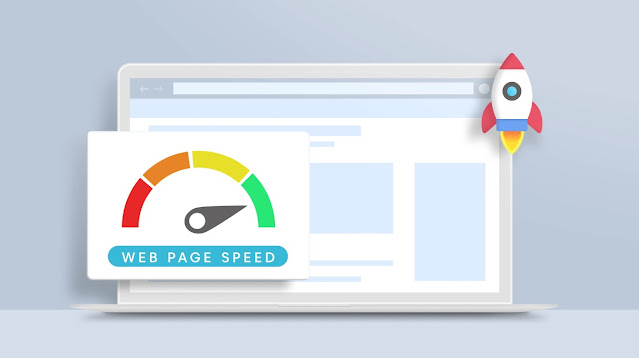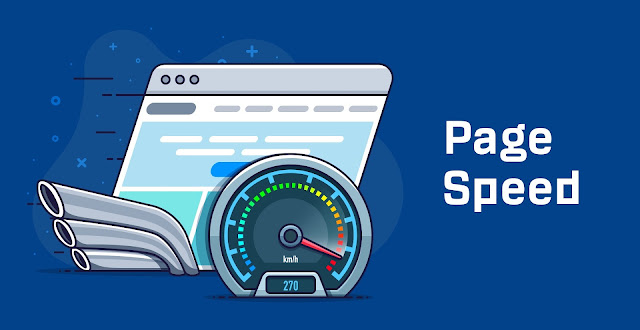Website Speed
WEBSITE SPEED ON-PAGE SEO: Website speed is an important factor in on-page SEO. A faster website provides a better user experience, which can lead to higher engagement and lower bounce rates. In addition, search engines like Google use page speed as a ranking factor in their algorithms.
There are several ways to improve the speed of your website, such as optimizing images and other media, reducing the number of HTTP requests, and minifying CSS and JavaScript files. You can also use a content delivery network (CDN) to speed up the delivery of your website's content to users.
It's important to note that while website speed is an important factor in on-page SEO, it's just one of many factors that search engines consider when ranking pages. Other important on-page factors include high-quality content, well-structured HTML, and the use of relevant keywords in the right places.
How to improve website speed
WEBSITE SPEED ON-PAGE SEO: Improving website speed can be a complex process, but here are some general tips to get started
- Optimize images: Large image files can slow down your website's loading time. Use image compression tools to reduce the size of your images without compromising on quality.
- Minimize HTTP requests: Every time a web page loads, it sends requests to the server for various elements such as images, CSS, and JavaScript files. Try to reduce the number of requests by using CSS sprites, combining JavaScript files, and using fewer images.
- Minify CSS and JavaScript files: Minifying CSS and JavaScript files removes unnecessary code, which can reduce their file size and improve loading times.
- Use a Content Delivery Network (CDN): A CDN stores your website's static files on servers located all around the world. This reduces the distance between your website's server and the user's browser, which can speed up the delivery of your website's content.
- Enable caching: Caching allows frequently accessed data to be stored on the user's computer or device, reducing the need for it to be loaded from the server every time the user visits your site.
- Reduce server response time: If your server takes a long time to respond to requests, it can slow down your website's loading time. Optimize your server configuration and consider upgrading to a faster server or web hosting plan if necessary.
- Use a lightweight theme and plugins: Themes and plugins with lots of features can add bloat to your website and slow it down. Use a lightweight theme and only essential plugins to minimize the impact on website speed.
These are just a few of the many ways to improve website speed. It's also important to regularly test your website's speed using tools like Google PageSpeed Insights or GTmetrix to identify areas for improvement.
Benefits of improved website speed
WEBSITE SPEED ON-PAGE SEO: Improving website speed can have several benefits for both users and website owners, including:
- Better user experience: A faster website provides a better user experience and can lead to increased user engagement and satisfaction. Users are more likely to stay on a website that loads quickly, which can result in lower bounce rates and higher conversion rates.
- Higher search engine rankings: Search engines like Google use website speed as a ranking factor in their algorithms. A faster website can improve your search engine rankings and increase visibility for your website.
- Increased website traffic: Websites with faster loading times often receive more traffic because they rank higher in search engine results pages (SERPs) and are more likely to be shared on social media platforms.
- Improved conversion rates: Faster websites have been shown to improve conversion rates, which can lead to increased revenue for e-commerce websites.
- Lower bounce rates: A slow-loading website can result in higher bounce rates, which means that users leave your website before taking any action. Improving website speed can reduce bounce rates and keep users on your website for longer.
- Improved website performance: A website with faster loading times can handle more traffic and provide a better user experience, even during peak periods of high traffic.
Overall, improving website speed can have a significant impact on user experience, search engine rankings, website traffic, and conversion rates, leading to increased revenue and business growth.
Tool to check website speed
WEBSITE SPEED ON-PAGE SEO: There are several tools available to check website speed. Here are a few popular options:
- Google PageSpeed Insights: This tool analyzes your website's speed and provides suggestions for improvement. It also provides a score out of 100 for both mobile and desktop versions of your website.
- GTmetrix: GTmetrix provides a detailed analysis of your website's speed and performance, including a PageSpeed score and a YSlow score. It also provides recommendations for improving your website's speed.
- Pingdom: This tool measures your website's loading speed from different locations around the world and provides a performance grade along with recommendations for improvement.
- WebPageTest: WebPageTest allows you to test your website's speed and performance from various locations and browsers. It provides a detailed report with performance metrics and waterfall charts.
- Lighthouse: Lighthouse is an open-source tool that can be run from the Google Chrome browser's developer tools. It provides a comprehensive report on various aspects of website performance, including speed, accessibility, and best practices.
What is best website speed
WEBSITE SPEED ON-PAGE SEO: There is no single answer to what the best website speed is because it can depend on various factors, such as the type of website, its functionality, and the location of its users. However, as a general rule, the ideal website speed should be as fast as possible.
According to Google, a website should ideally load in under 3 seconds, as website visitors tend to lose interest and leave the site if it takes longer than that to load. In fact, research has shown that even a one-second delay in page load time can result in a 7% reduction in conversions.
However, different types of websites may have different speed requirements. For example, e-commerce websites with a lot of images and videos may take longer to load than a simple blog or informational website. Similarly, websites with a global audience may need to consider the impact of distance and latency on their website speed.
Ultimately, the best website speed is one that provides a fast and seamless user experience while also meeting the needs of the website owner and their target audience.











0 Comments